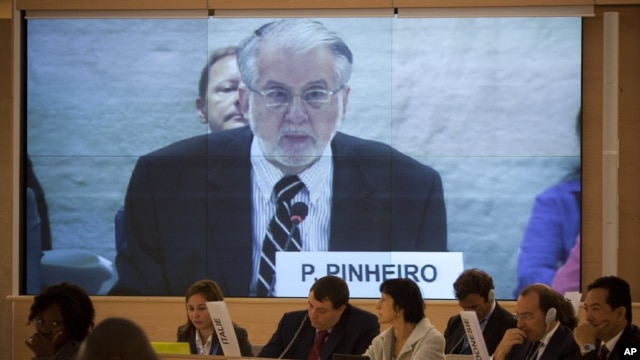
Brazilian diplomat Paulo Sergio Pinheiro delivers the report of the Independent Commission of Inquiry on Syria during to the Human Rights Council at the United Nations in Geneva, Switzerland, September 17, 2012.
GENEVA —
United Nations investigators say civilians are increasingly coming under attack by both Syrian government forces and rebels.
The Independent International Commission of Inquiry of Syria, which presented its findings to the U.N. Human Rights Council on Monday, finds violations of human rights in Syria have grown.
It says the frequency with which the alleged violations occur outstrips the commission's ability to investigate them.
The chairman of the independent commission, Paulo Pinheiro, says civilians, many of them children, are bearing the brunt of spiraling violence. He says there has been an escalation of attacks on civilians and this reflects a disregard for rules of armed conflict from both government forces and rebels.
But the panel's report, completed last month, said while both government and anti-government forces committed war crimes, the abuses by opposition forces – while serious – did not reach the "gravity, frequency and scale" of those carried out by pro-government sides.
Government criticized
Pinheiro criticized the Syrian government's refusal to grant the commission access to the country, which continues, he says, to hamper investigations.
Despite this, he said the commission has found that government forces acting with the pro-government Shabiha militia were responsible for the killings of dozens of women and children during a massacre in May in Houla, a town north of the flashpoint city of Homs.
"The commission found reasonable grounds to believe that during this reporting period government forces and the Shabiha committed war crimes, gross human rights violations and international crimes," he said.
"Turning to violations by anti-government armed groups, there are reasonable grounds to believe that war crimes, including murder, extrajudicial execution and torture, were perpetrated by these groups," Pinheiro added.
The Syrian government representative in Geneva, Faysal Khabbaz Hamoui, dismissed the U.N. accusations as politically biased.
Hamoui blamed the United States and, what he called, its "tools" in the area for the continuation of the crisis.
"The continuation of funding and arming armed groups in addition to the misleading media information and trying to send more and more jihadists from Afghanistan, Yemen, Libya and other countries – all this will not help these parties at all," Hamoui said.
The ambassador said Syria takes seriously its obligation to save the lives of its people and to preserve their security. He says there can be no legal or moral cover for terrorism, which he blames on the rebels.
Fewer rebel abuses
But the U.N.'s Pinheiro said the crimes and abuses committed by rebels are less frequent and less intense than those committed by Syrian government forces and the Shabiha.
A spokesman for the opposition Syrian Observatory for Human Rights said he had read the report but could not comment.
In a separate report Monday, Human Rights Watch said Syrian rebels have committed war crimes, including torture and killing of detainees, Human Rights Watch called on nations supporting the rebels to press them to respect humanitarian law.
Human Rights Watch said opposition leaders have vowed to respect human rights and have taken measures to curb abuses. But the group said in a statement that it has concerns about comments by some opposition leaders saying they tolerate executions.
The U.N.'s Pinheiro, backing up Syrian government claims, said U.N. investigators have proof that rebels are being aided by Islamist militants - claims the rebels deny.
"The commission confirmed the increasing and alarming presence of foreign elements, including Jihadist militants in Syria," he said. "Some are joining anti-government forces while others are establishing their own groups and operate independently. Such elements tend to push anti-government fighters towards more radical positions."
Pinheiro said the commission has collected a body of evidence, which will be kept on file for possible future trials. He said U.N. investigators have drawn up a list of people believed to be responsible for war crimes.
Border raid
In a sign of the conflict's regional perils, Lebanese security officials said the Syrian Air Force raided an area near the Syrian-Lebanese border Monday, but there were no reports of casualties.
​​
Missiles from two Syrian warplanes, followed by helicopter fire, hit an area just inside Lebanese territory where opposition rebels had fled.
Also Monday, Lebanon's President Michel Suleiman asked Iran for an official explanation of remarks attributed to a senior Iranian commander that Tehran’s powerful Revolutionary Guard has military advisers in Lebanon and Syria.
Separately, Iranian Foreign Minister Ali Akbar Salehi said he is "hopeful" about a meeting of a four-nation dialogue group on Syria later Monday in Cairo with his counterparts from Turkey, Egypt and Saudi Arabia.
Inside Syria, activists reported that government troops shelled rebel-held areas around the country including the northern city of Aleppo and the Damascus neighborhood of Hajar Aswad.
The United Nations says more than 20,000 people have been killed in the conflict, 1.2 million are uprooted within Syria and more than 250,000 have fled abroad. |
|
